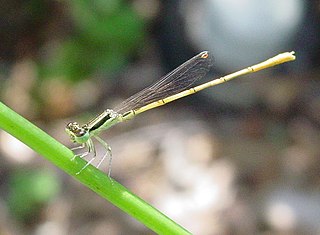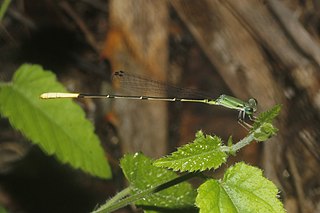
The insect family Coenagrionidae is placed in the order Odonata and the suborder Zygoptera. The Zygoptera are the damselflies, which although less known than the dragonflies, are no less common. More than 1,300 species are in this family, making it the largest damselfly family. The family Coenagrionidae has six subfamilies: Agriocnemidinae, Argiinae, Coenagrioninae, Ischnurinae, Leptobasinae, and Pseudagrioninae.

The citrine forktail is a damselfly of the family Coenagrionidae.

Ischnura aurora, the gossamer damselfy or golden dartlet and also known as the aurora bluetail, is a species of damselfly in the family Coenagrionidae.
Azuragrion granti, the Socotra bluet or Grant's bluet, is a species of narrow-winged damselfly in the family Coenagrionidae. It is endemic to Socotra in the Indian Ocean. It is a member of the narrow-winged damselfly family Coenagrionidae with its closest relatives originating in Africa, for example Azuragrion nigridorsum.

Leptobasis is a small genus of damselflies in the family Coenagrionidae. They are commonly known as swampdamsels. The genus is neotropical and one species, L. melinogaster, has been recorded in Texas. They are slender and the females have very long ovipositors.

Enallagma traviatum is a species of small damselfly in the family Coenagrionidae. It is commonly known as the slender bluet. The slender is small about 29–32 mm in length.
Macushi is an indigenous language of the Carib family spoken in Brazil, Guyana and Venezuela. It is also referred to as Makushi, Makusi, Macuxi, Macusi,Macussi,Teweya or Teueia. It is the most populous of the Cariban languages. According to Instituto Socioambiental, the Macushi population is at an estimated 43,192, with 33,603 in Brazil, 9,500 in Guyana and 89 in Venezuela. In Brazil, the Macushi populations are located around northeastern Roraima, Rio Branco, Contingo, Quino, Pium and Mau rivers. Macuxi speakers in Brazil, however, are only estimated at 15,000.

Aciagrion hisopa, is a species of damselfly in the family Coenagrionidae. It is abundant in many South Asian countries, but populations in Sri Lanka is still in doubt.
Denticulobasis dunklei is a species of damselfly in the family Coenagrionidae first identified in Loreto, Peru.
Denticulobasis garrisoni is a species of damselfly in the family Coenagrionidae first identified in Rondônia, Brazil.
Denticulobasis ariken is a species of damselfly in the family Coenagrionidae first identified in Rondônia, Brazil.
Tuberculobasis arara is a species of damselfly in the family Coenagrionidae first identified in Rondônia, Brazil.
Tuberculobasis geijskesi is a species of damselfly in the family Coenagrionidae first identified in Suriname.
Tuberculobasis guarani is a species of damselfly in the family Coenagrionidae first identified in São Paulo, Brazil.
Tuberculobasis karitiana is a species of damselfly in the family Coenagrionidae first identified in Rondônia, Brazil.
Tuberculobasis tirio is a species of damselfly in the family Coenagrionidae first identified in Pará, Brazil.
Tuberculobasis williamsoni is a species of damselfly in the family Coenagrionidae first identified in Colombia and Venezuela.

Argia vivida, the vivid dancer, is a species of narrow-winged damselfly in the family Coenagrionidae. This species is commonly found in springs and forests Central America and North America. Argia vivida inhabit areas of diverse temperatures due to thermoregulation. The species is also considered the state insect of Nevada.

BR-401 is a federal highway in the state of Roraima in Brazil. The 202.9 km (126.1 mi) road connects Boa Vista with Normandia and the road network of Guyana.







